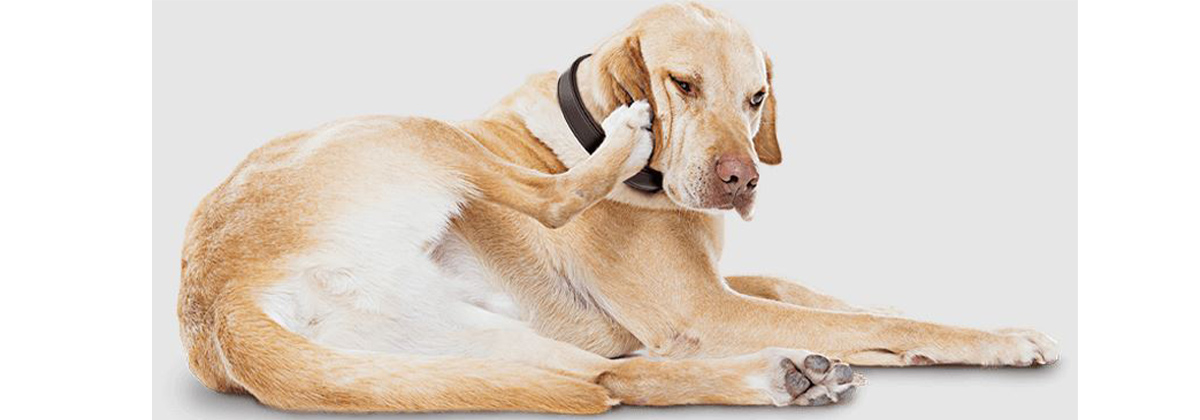05 Feb Itching in dogs: Causes, Symptoms, & Treatment (Part 1)
We sometimes feel itchy in our skin. Dogs sometimes scratch themselves too, which is perfectly normal. But if you see your dog constantly scratching a certain part of his body, his skin is injured, he’s shedding, or he can’t sleep at night because of itching, he has an abnormal problem. So it’s better to think about treating itching in dogs. An itchy dog, scratches his skin too much and bites or licks his body. Itchy skin can be very upsetting for a dog and shouldn’t be ignored at all. If you’re worried about excessive dog itching, there are home remedies for it that are completely safe and easy to use. In this article, we will explain them completely.
The cause of itching in the dog
Itching isn’t a dog’s disease, it’s just a sign or symptom of something like a parasite on the dog’s skin. Something may be happening inside the dog’s body (such as an allergic reaction or fungal disease). Many skin diseases don’t cause itching at first, but secondary bacterial or fungal infections that occur afterwards may even cause itching. Even when the itching occurs, the underlying disease may be completely gone. Another cause of itching in dogs is skin diseases caused by immune system disorders, which of course are very rare. Itching isn’t normal if it happens too much (more than 4-5 times a day) or is accompanied by these symptoms:
- Alopecia (hair loss and baldness in some parts of the skin)
- the pain
- The dog may injure his skin by scratching or biting too much
- Pimples or redness of the skin
- Hair colour changes due to excessive licking
- Darkening and thickening of the skin
Some dogs scratch and lick their skin as they hide. So you have to pay attention to this issue as well. Itching may be in all parts of the skin or limited to a specific area. To treat a dog’s itching, we need to know the cause. Itching is usually caused by one of these four factors:
- parasites
- Allergies
- skin dryness
- Skin infections
parasites
Several parasites can cause itching and discomfort in dogs.
Flea
These insidious insects can grow incredibly fast and make your dog’s life miserable. Fleas are just interested in humans. One flea can bite a dog up to 400 times a day. The lifespan of each flea is 100 days. The flea bite is painful. In addition, the salivary glands secrete substances that cause itchy skin. Flea bites in some dogs also cause allergies and dermatitis, which make shedding. The fleas are blackish-brown and when they mature they are about 3 mm in size. If you look closely, you can also see flea stools, which are very soft like soil and are digested by blood. If your dog has fleas, be sure to see a veterinarian.
Tick
Ticks get stuck when we take the dog out. Then they start eating the dogs’ blood until their stomachs are full and they swell. Then they throw themselves down from the dog’s body. You may not see the tick yourself and only find signs of a bite. There’s a red spot on the skin where it sticks, which is very irritating. Another problem is that ticks can be carriers of some diseases, such as Lyme. So it’s important to think about them as soon as possible.
Mite
The mites are very small and less than one millimetre long. They aren’t insects like ticks but are considered to be related to spiders and have eight legs. These insects can also cause itching, dry skin and shedding in dogs. Mites cause scabies, which causes hair loss in some parts of the body. Some types of dog mites can also cause baldness in humans. The itching of a dog’s ear may be due to the dog having mites in his ears. An itchy dog constantly scratches his ear or nods his head. For any disease caused by mites, you must seek help from a veterinarian.
skin dryness
Dry weather in winter can cause dryness and itching of the dog’s skin. If a dog swims in water disinfected with chemicals such as chlorine in the summer, it may affect his skin. Some shampoos and soaps can also cause dry skin. Conversely, there are some shampoos for dry skin and anti-itch shampoos for dogs that help to moisturize and reduce the discomfort of the dog.




Sorry, the comment form is closed at this time.